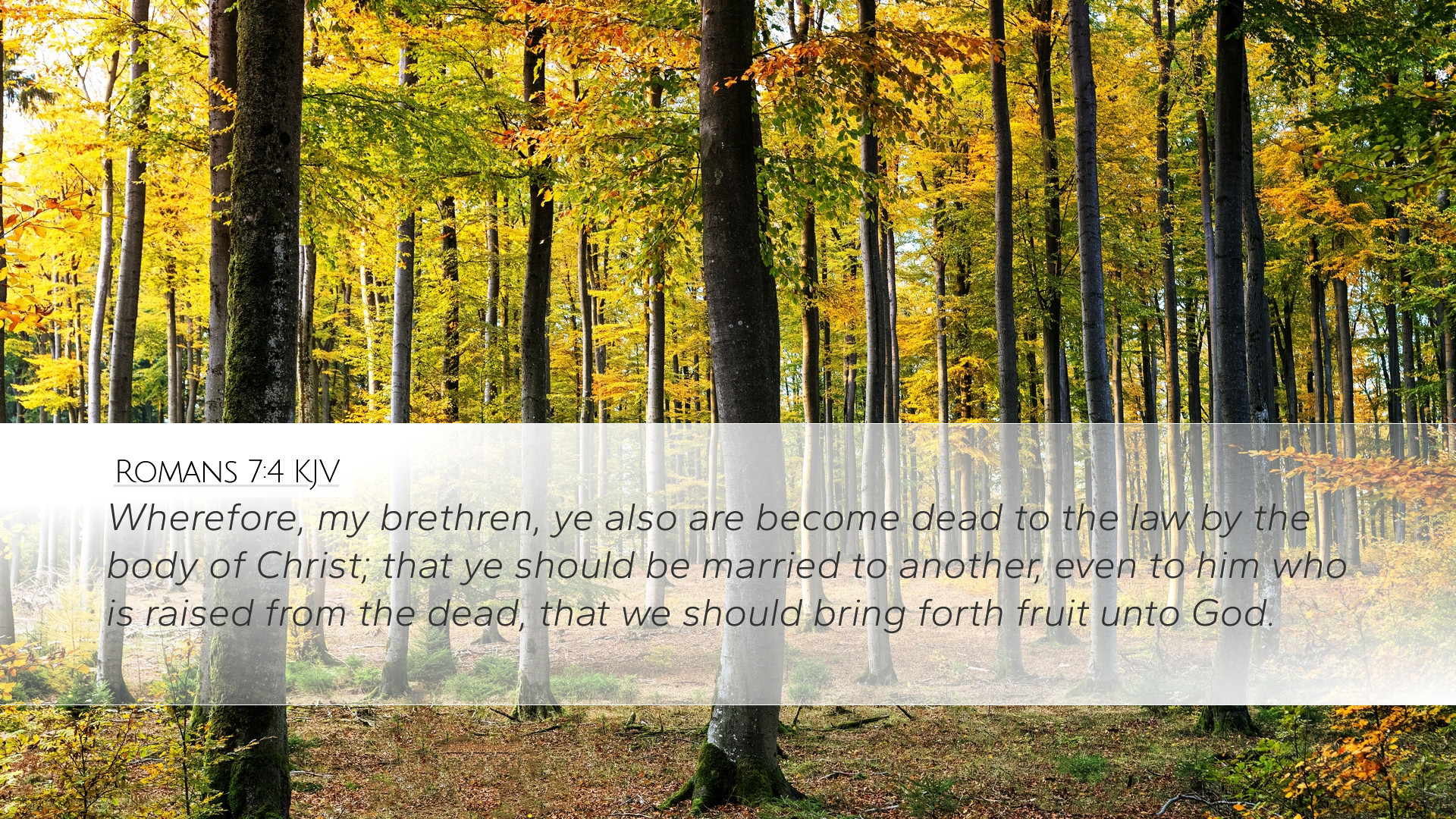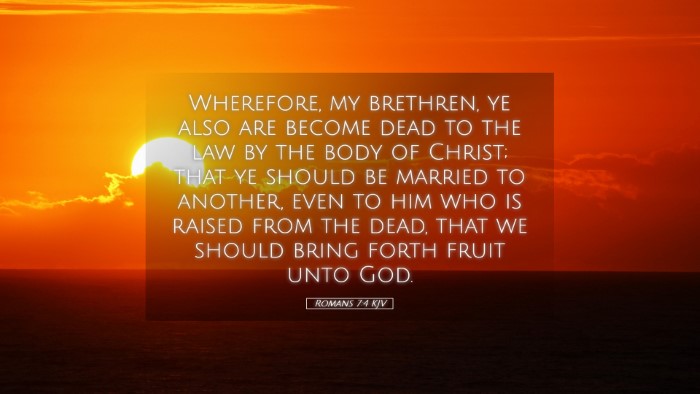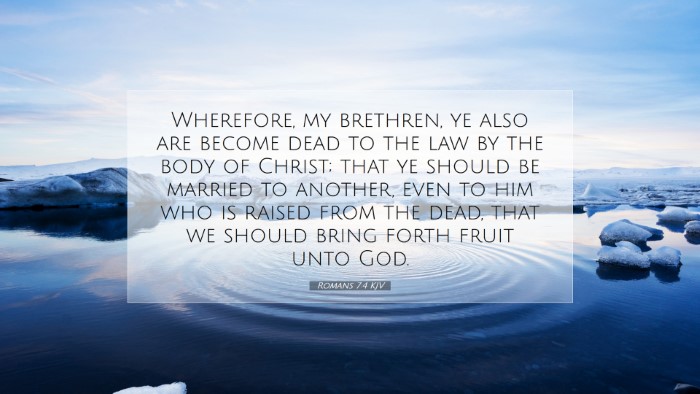Old Testament
Genesis Exodus Leviticus Numbers Deuteronomy Joshua Judges Ruth 1 Samuel 2 Samuel 1 Kings 2 Kings 1 Chronicles 2 Chronicles Ezra Nehemiah Esther Job Psalms Proverbs Ecclesiastes Song of Solomon Isaiah Jeremiah Lamentations Ezekiel Daniel Hosea Joel Amos Obadiah Jonah Micah Nahum Habakkuk Zephaniah Haggai Zechariah MalachiRomans 7:4
Romans 7:4 KJV
Wherefore, my brethren, ye also are become dead to the law by the body of Christ; that ye should be married to another, even to him who is raised from the dead, that we should bring forth fruit unto God.
Romans 7:4 Bible Commentary
Commentary on Romans 7:4
Romans 7:4 (KJV): "Wherefore, my brethren, ye also are become dead to the law by the body of Christ; that ye should be married to another, even to him who is raised from the dead, that we should bring forth fruit unto God."
Introduction
The Apostle Paul, in his epistle to the Romans, presents profound theological insights on the relationship between the law, sin, and salvation through Jesus Christ. Romans 7:4 serves as a crucial verse in understanding the believer's liberation from the law and their union with Christ. This commentary synthesizes insights from public domain resources to enlighten pastors, students, theologians, and Bible scholars.
Exegesis of the Text
Dead to the Law
Paul states that "ye also are become dead to the law." This phrase embodies a significant transition for believers; they are no longer under the law’s dominion. According to Matthew Henry, this death signifies a release from the condemnation and obligation of the law, akin to the death of a spouse freeing one from marital bonds. The law can no longer accuse or demand righteousness from those who are united in Christ.
The Body of Christ
The law's claim on humanity was fulfilled in the sacrificial death of Christ. Albert Barnes emphasizes that Christ's body, given at the crucifixion, serves as the mechanism through which believers are liberated. By sharing in Christ’s death through faith, they experience a spiritual severance from the law’s authoritative grip.
Married to Another
Paul continues, stating that believers are "married to another." This metaphor illustrates a new relationship through Christ’s resurrection, signifying a union that is both intimate and productive. Adam Clarke interprets this as believers being wed to Christ, a union that generates spiritual life and fruitfulness for God, contrary to the fruitlessness of life under the law.
Theological Implications
Freedom from the Law
The notion of being “dead to the law” acquires significant theological weight. According to Matthew Henry, this freedom does not equate to lawlessness but rather to a transformed state of living out of grace rather than obligation. Believers are called to a life where love for Christ inspires obedience, transcending the letter of the law.
Union with Christ
This union with Christ is foundational to Christian identity. As Barnes notes, it is through this union that believers find their purpose in life—a commitment to bear fruit unto God. Such fruitfulness is a manifestation of the Holy Spirit’s work in the believer’s life, distinguishing it from the striving under the law that leads to despair.
Fruitfulness in the Christian Life
In this new marital relationship with Christ, believers are called to bear fruit, as noted by Clarke. The fruit referred to can be understood in terms of character (the fruits of the Spirit), good works, and the advance of the Gospel. This productiveness stems not from the obligation to adhere to the law but rather as a natural byproduct of a vital connection with Christ.
Practical Applications
Living in Grace
For the believer, the call to live dead to the law demands a life lived in the realization of grace. Matthew Henry encourages believers to comprehend the depth of grace; knowing that they are not bound to the law but are invited to freely love and serve God elicits worship and obedience from the heart.
Understanding the Nature of Christian Freedom
Furthermore, understanding freedom from the law challenges contemporary misconceptions of Christian liberty. Albert Barnes stresses that true freedom manifests not in rebellion against God’s commandments but in joyful obedience—serving God willingly resulting in spiritual growth.
A Life of Fruitfulness
Lastly, the commitment to being fruitful for God involves active participation in faith communities and good works. Believers are encouraged to assess their lives continually: are they producing spiritual fruit? Clarke reminds us that such fruit is not merely the result of self-effort but leaves room for divine empowerment through the Holy Spirit that flows from the believer's relationship with Christ.
Conclusion
Romans 7:4 paints a vivid picture of the transformative power of Christ's death and resurrection. It articulates the believer’s transition from the law to a dynamic and fruitful relationship with Christ. The insights gathered from public domain commentaries provide a robust theological framework that underscores the grace, freedom, and responsibility inherent in the believer’s walk of faith.


